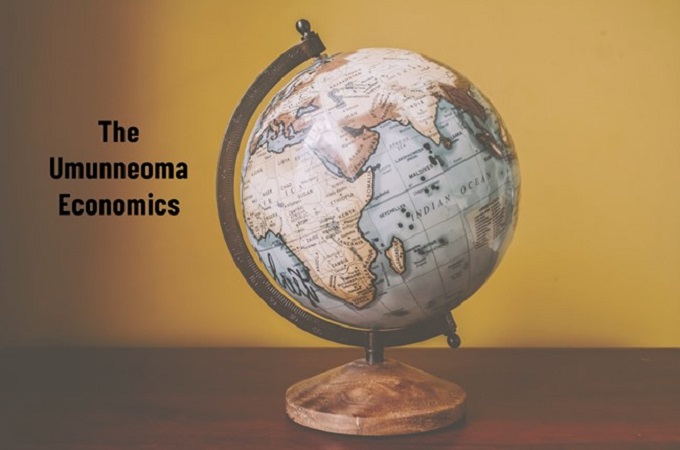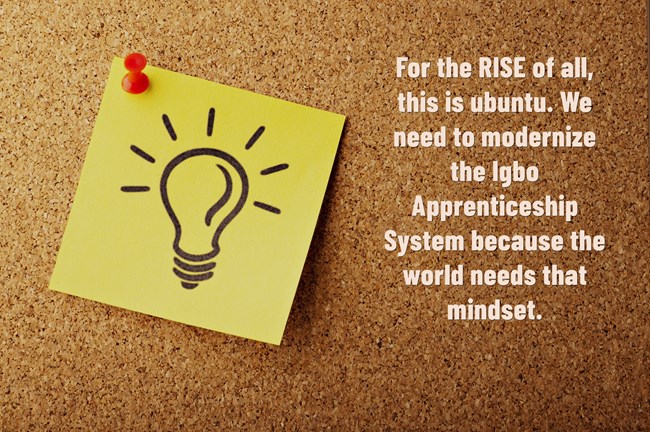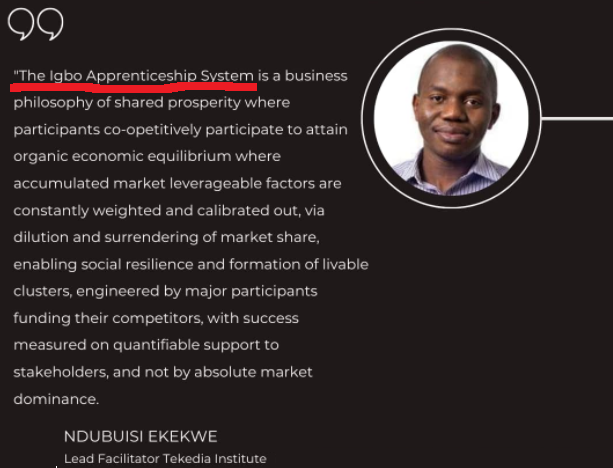
In my 2019 convocation lecture in FUTO (Federal University of Technology, Owerri Nigeria), I spoke on economic opportunities in Nigeria – and The Umunneoma Economics. (Umunneoma means “good brethren” in Igbo). In my postulation, I explained how that economic philosophy is the pillar that drives the Igbo Apprenticeship System. The new global capitalist manifesto which is working to go beyond fixated focus on shareholders, to consider ALL stakeholders, is something the Umunneoma Economics is doing already.
The core tenet of the Igbo Apprenticeship System could be likened to the U.S. Federal Reserve which largely works to keep the U.S. dollars stable (by reducing inflation) and maximize employment through interest rates. So, the Reserve has defined main focus areas even though it can use its systems to do other things. Consequently, the U.S. Congress uses those two main factors to ascertain the effectiveness of the Reserve policy. The Umunneoma Economics solves unemployment in communities even as it strengths communities.
The Igbo Apprenticeship System is a business philosophy of shared prosperity where participants co-opetitively participate to attain organic economic equilibrium where accumulated market leverageable factors are constantly weighted and calibrated out, via dilution and surrendering of market share, enabling social resilience and formation of livable clusters, engineered by major participants funding their competitors, with success measured on quantifiable support to stakeholders, and not by absolute market dominance.
Register for Tekedia Mini-MBA edition 19 (Feb 9 – May 2, 2026): big discounts for early bird.
Tekedia AI in Business Masterclass opens registrations.
Join Tekedia Capital Syndicate and co-invest in great global startups.
Register for Tekedia AI Lab: From Technical Design to Deployment (next edition begins Jan 24 2026).
For the Igbo Apprenticeship System, the main focus is to prevent poverty by mass-scaling opportunities for everyone, and not for building conglomerates! It makes no sense in Adam Smith Economics that a man will build a business, accumulate a market share, and one day decides to relinquish some – and even go further by funding his competitors. But he is accomplished by doing so: those competitors are his brethren (umunneoma) and they will RISE with him. In a world of inequality, despite the obvious inefficiency in this system – lack of scale reduces the capacity to solve big problems – it is all about ubuntu.

There are great lessons from African tradition: “Onye aghana nwanne ya”- do not leave your brethren behind. Like I tell people, it would be nearly impossible to have extremely rich Igbo traders because they win by funding competitors and dividing their market shares through the Igbo apprenticeship system. How can a man give his customers to his brethren just to ensure he does not close his shop and move to the village?
In this time of winner-takes-all, the world needs the spirit of Umunneoma Economics and the framework of an institutionalized and modernized Igbo Apprenticeship System (IAS). A vision to have that conglomerate is possible if all the members of the IAS can feed into an entity which all of them will co-own as a cooperative.

You can all make shoes but a major shoe brand with an international focus will buy shoes from the members, making sure that each member becomes a “supplier” to the brand. That brand entity will have scale and capacity to compete and win at the global arena. Yes, at the downstream, members can continue to do business on their ubuntu mindsets, but this unified brand can scale and move upstream, and attain a global status.
---
Connect via my
LinkedIn |
Facebook |
X |
TikTok |
Instagram |
YouTube



The Umenneoma Economics has its defects at Macroeconomic level. How will this system advance the capital market? I do think it’s one of the main reasons we do not have many companies listed in the stock exchange. With all the buying and selling going on in the land, you barely see a large retail chain listed in our stock market. Ordinarily, retail and distribution companies should dominate our Exchange, looking at the nature of our economy, but they are nowhere.
Again, how will Umenneoma Economics fund R&D? Because the massive capital needed in that space may not give room for investors to do continuous giveaway with market share, and without strong R&D market, profound innovation may never happen. This also extends to property rights, the patent market.
The approach entrenches informal economy, which is very difficult to measure and scale, making funding large public projects almost impossible. There are lots of things that will require rethinking, if we are to move from primitive to contemporary. Individuals are never good at organizing and scaling things, you need systems and teams to do so.
The economy runs with too many handbrakes, including education system that has failed to educate, let alone transform the economy.
“The Umenneoma Economics has its defects at Macroeconomic level. How will this system advance the capital market? ‘ – I answered at the end of the piece:”co-own as a cooperative”. If that happens, UE will produce MNCs. Peak Milk maker is a coop of Dutch diary farmers and it is one of the world’s largest agro-empires.